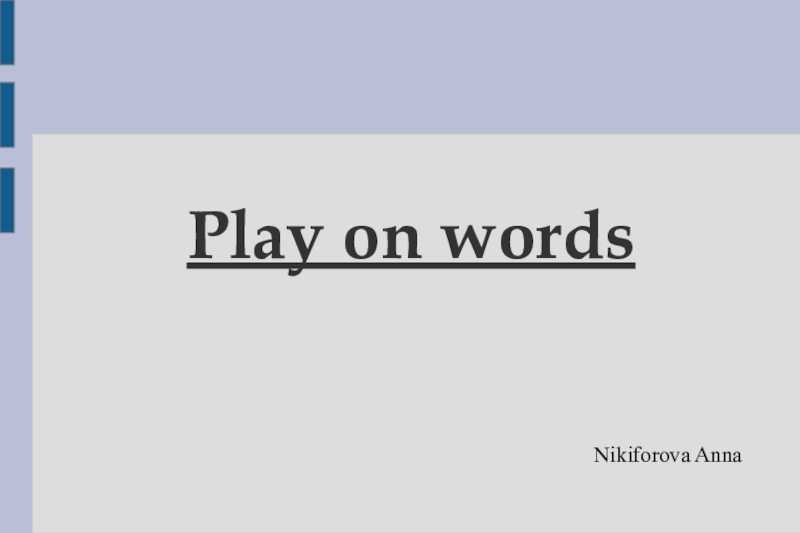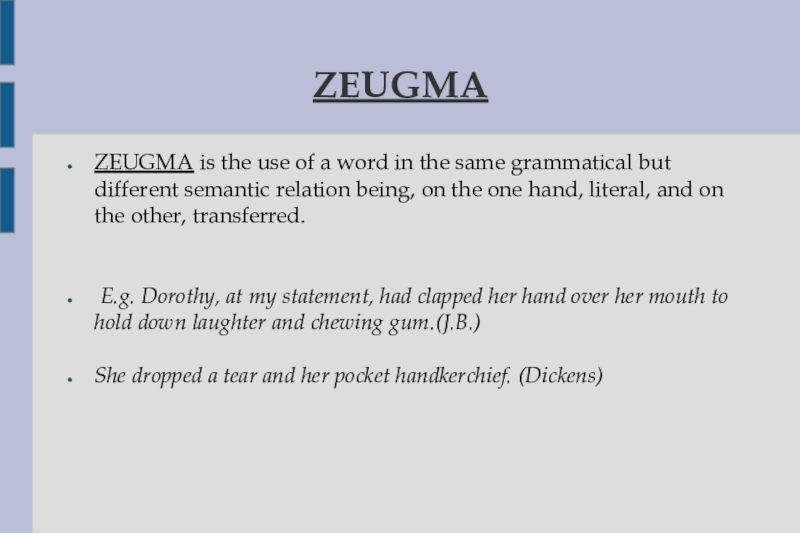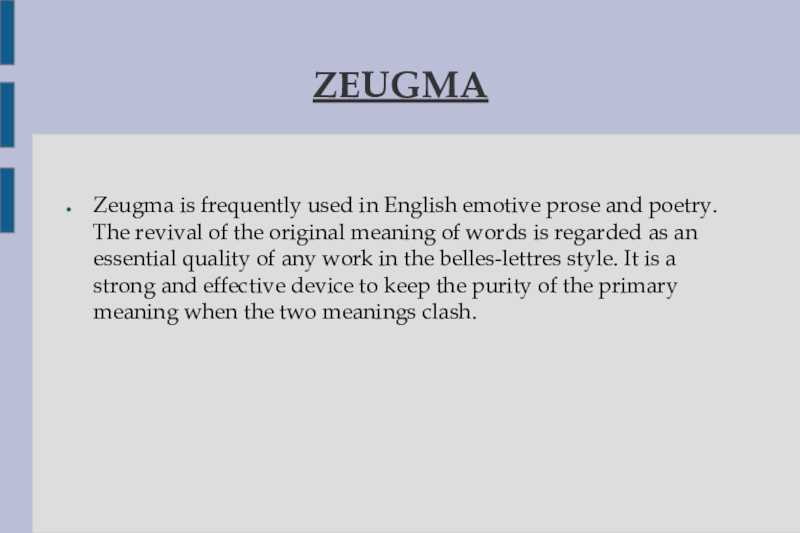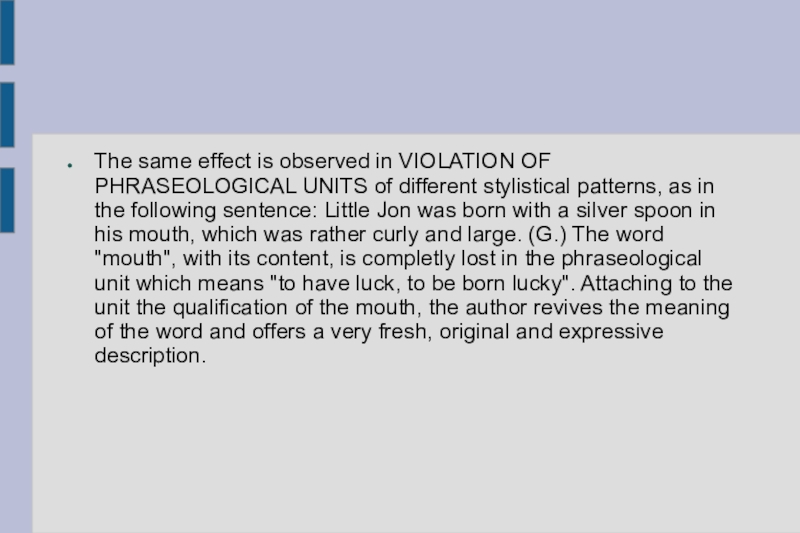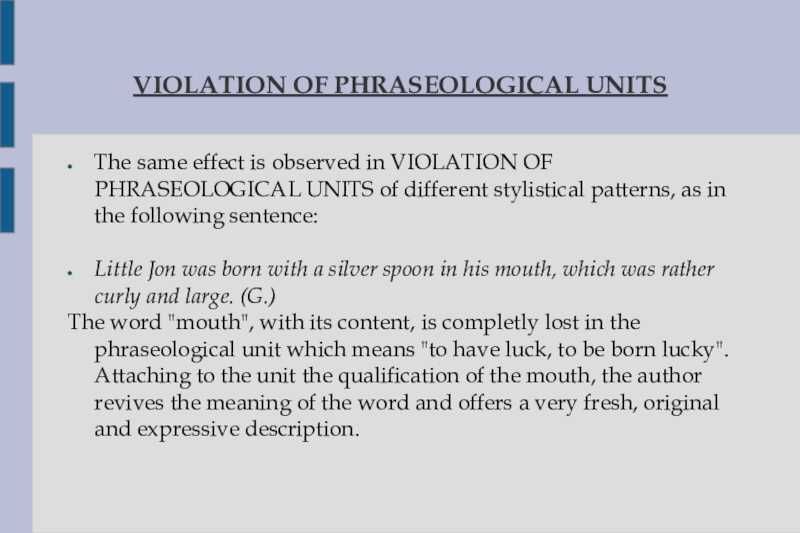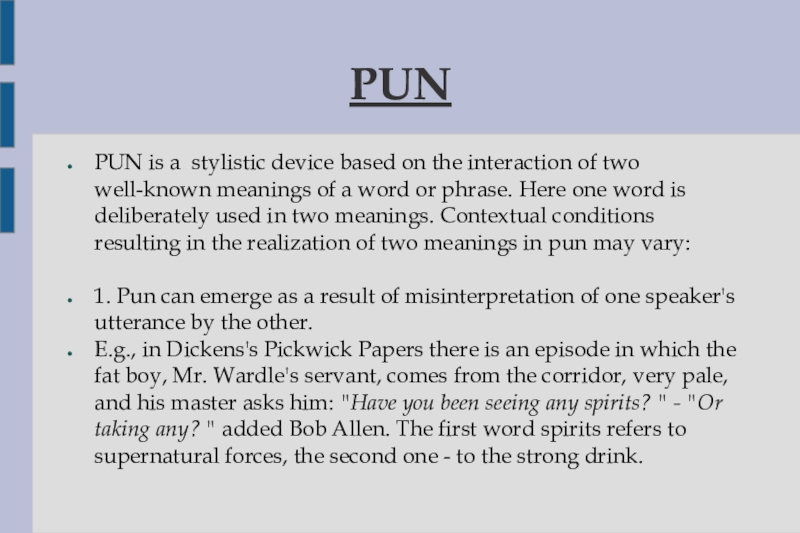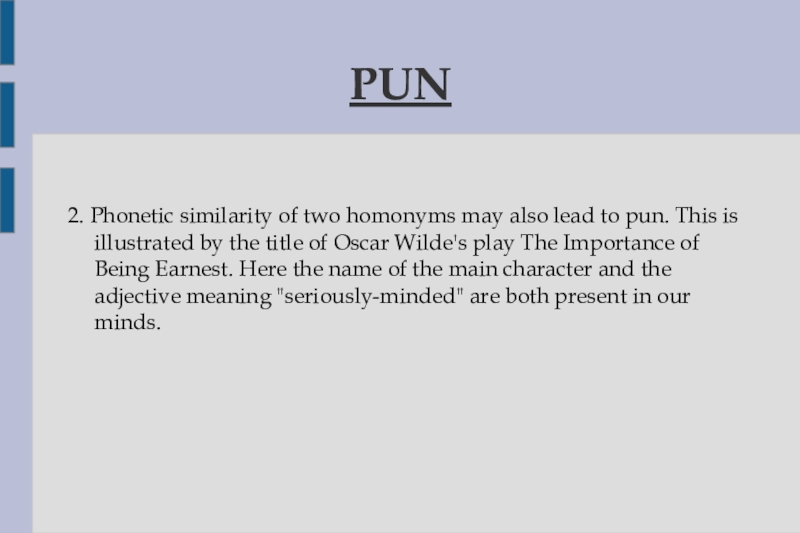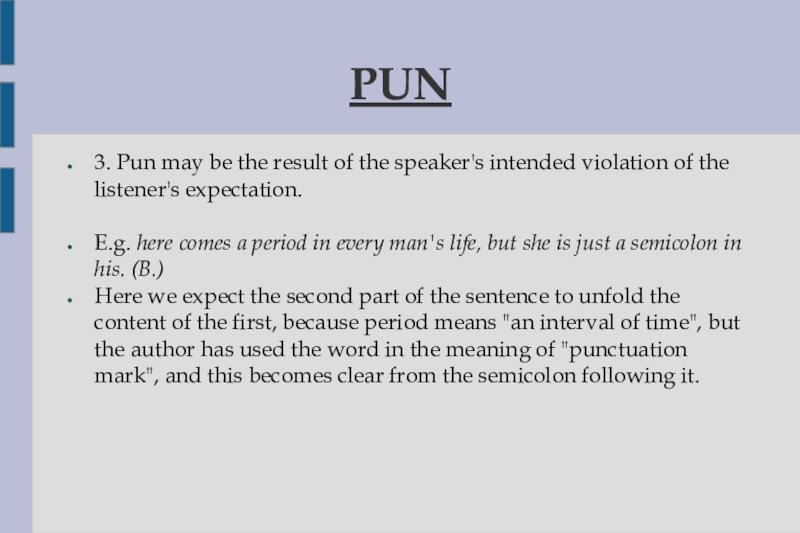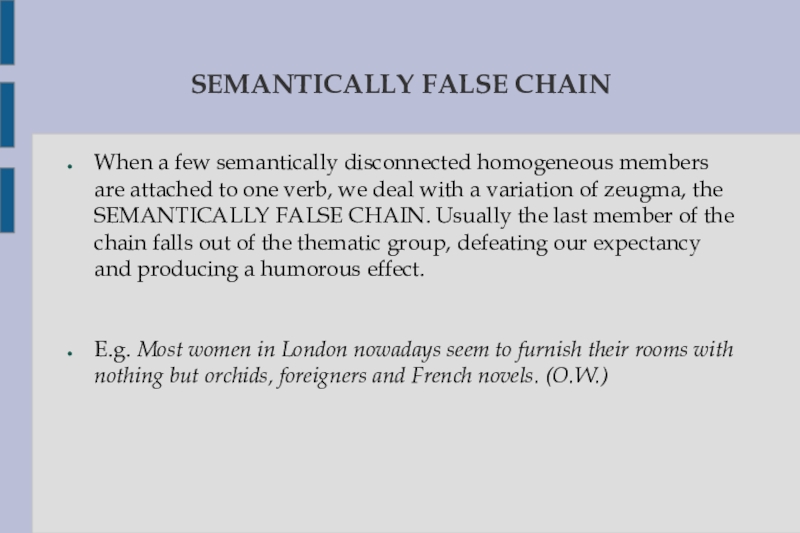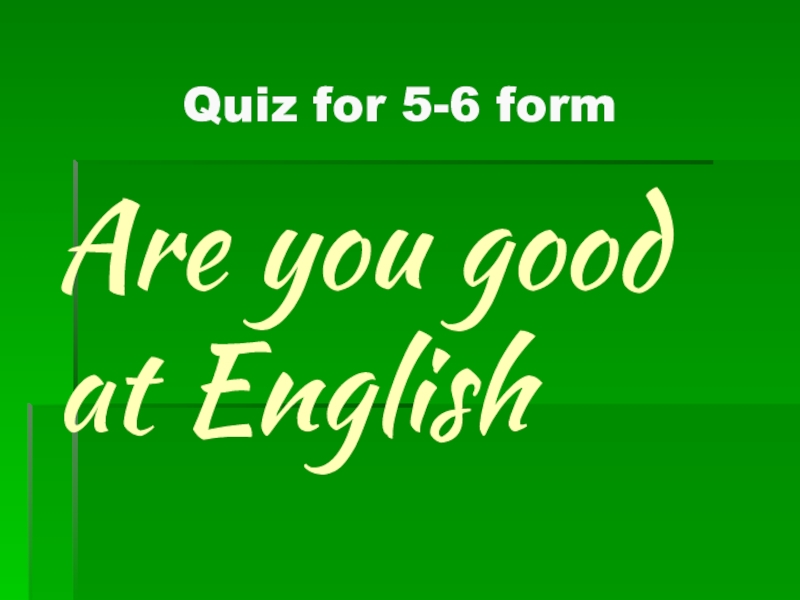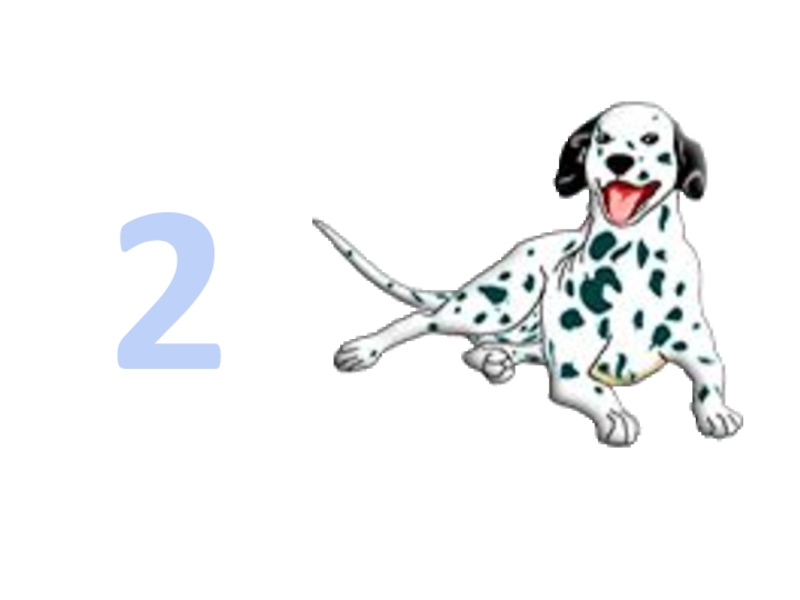- Главная
- Разное
- Образование
- Спорт
- Естествознание
- Природоведение
- Религиоведение
- Французский язык
- Черчение
- Английский язык
- Астрономия
- Алгебра
- Биология
- География
- Геометрия
- Детские презентации
- Информатика
- История
- Литература
- Математика
- Музыка
- МХК
- Немецкий язык
- ОБЖ
- Обществознание
- Окружающий мир
- Педагогика
- Русский язык
- Технология
- Физика
- Философия
- Химия
- Шаблоны, фоны, картинки для презентаций
- Экология
- Экономика
Презентация, доклад на тему Игра слов в английском языке
Содержание
- 1. Игра слов в английском языке
- 2. ZEUGMA ZEUGMA is the use of a
- 3. ZEUGMA Zeugma is frequently used in English
- 4. The same effect is observed in VIOLATION
- 5. VIOLATION OF PHRASEOLOGICAL UNITSThe same effect is
- 6. PUNPUN is a stylistic device based on
- 7. PUN2. Phonetic similarity of two homonyms may
- 8. PUN3. Pun may be the result of
- 9. SEMANTICALLY FALSE CHAINWhen a few semantically disconnected
ZEUGMA ZEUGMA is the use of a word in the same grammatical but different semantic relation being, on the one hand, literal, and on the other, transferred. E.g. Dorothy, at my statement, had clapped her hand
Слайд 2ZEUGMA
ZEUGMA is the use of a word in the same
grammatical but different semantic relation being, on the one hand, literal, and on the other, transferred.
E.g. Dorothy, at my statement, had clapped her hand over her mouth to hold down laughter and chewing gum.(J.B.)
She dropped a tear and her pocket handkerchief. (Dickens)
E.g. Dorothy, at my statement, had clapped her hand over her mouth to hold down laughter and chewing gum.(J.B.)
She dropped a tear and her pocket handkerchief. (Dickens)
Слайд 3ZEUGMA
Zeugma is frequently used in English emotive prose and poetry.
The revival of the original meaning of words is regarded as an essential quality of any work in the belles-lettres style. It is a strong and effective device to keep the purity of the primary meaning when the two meanings clash.
Слайд 4
The same effect is observed in VIOLATION OF PHRASEOLOGICAL UNITS of
different stylistical patterns, as in the following sentence: Little Jon was born with a silver spoon in his mouth, which was rather curly and large. (G.) The word "mouth", with its content, is completly lost in the phraseological unit which means "to have luck, to be born lucky". Attaching to the unit the qualification of the mouth, the author revives the meaning of the word and offers a very fresh, original and expressive description.
Слайд 5VIOLATION OF PHRASEOLOGICAL UNITS
The same effect is observed in VIOLATION OF
PHRASEOLOGICAL UNITS of different stylistical patterns, as in the following sentence:
Little Jon was born with a silver spoon in his mouth, which was rather curly and large. (G.)
The word "mouth", with its content, is completly lost in the phraseological unit which means "to have luck, to be born lucky". Attaching to the unit the qualification of the mouth, the author revives the meaning of the word and offers a very fresh, original and expressive description.
Little Jon was born with a silver spoon in his mouth, which was rather curly and large. (G.)
The word "mouth", with its content, is completly lost in the phraseological unit which means "to have luck, to be born lucky". Attaching to the unit the qualification of the mouth, the author revives the meaning of the word and offers a very fresh, original and expressive description.
Слайд 6PUN
PUN is a stylistic device based on the interaction of two
well-known meanings of a word or phrase. Here one word is deliberately used in two meanings. Contextual conditions resulting in the realization of two meanings in pun may vary:
1. Pun can emerge as a result of misinterpretation of one speaker's utterance by the other.
E.g., in Dickens's Pickwick Papers there is an episode in which the fat boy, Mr. Wardle's servant, comes from the corridor, very pale, and his master asks him: "Have you been seeing any spirits? " - "Or taking any? " added Bob Allen. The first word spirits refers to supernatural forces, the second one - to the strong drink.
1. Pun can emerge as a result of misinterpretation of one speaker's utterance by the other.
E.g., in Dickens's Pickwick Papers there is an episode in which the fat boy, Mr. Wardle's servant, comes from the corridor, very pale, and his master asks him: "Have you been seeing any spirits? " - "Or taking any? " added Bob Allen. The first word spirits refers to supernatural forces, the second one - to the strong drink.
Слайд 7PUN
2. Phonetic similarity of two homonyms may also lead to pun.
This is illustrated by the title of Oscar Wilde's play The Importance of Being Earnest. Here the name of the main character and the adjective meaning "seriously-minded" are both present in our minds.
Слайд 8PUN
3. Pun may be the result of the speaker's intended violation
of the listener's expectation.
E.g. here comes a period in every man's life, but she is just a semicolon in his. (B.)
Here we expect the second part of the sentence to unfold the content of the first, because period means "an interval of time", but the author has used the word in the meaning of "punctuation mark", and this becomes clear from the semicolon following it.
E.g. here comes a period in every man's life, but she is just a semicolon in his. (B.)
Here we expect the second part of the sentence to unfold the content of the first, because period means "an interval of time", but the author has used the word in the meaning of "punctuation mark", and this becomes clear from the semicolon following it.
Слайд 9SEMANTICALLY FALSE CHAIN
When a few semantically disconnected homogeneous members are attached
to one verb, we deal with a variation of zeugma, the SEMANTICALLY FALSE CHAIN. Usually the last member of the chain falls out of the thematic group, defeating our expectancy and producing a humorous effect.
E.g. Most women in London nowadays seem to furnish their rooms with nothing but orchids, foreigners and French novels. (O.W.)
E.g. Most women in London nowadays seem to furnish their rooms with nothing but orchids, foreigners and French novels. (O.W.)
